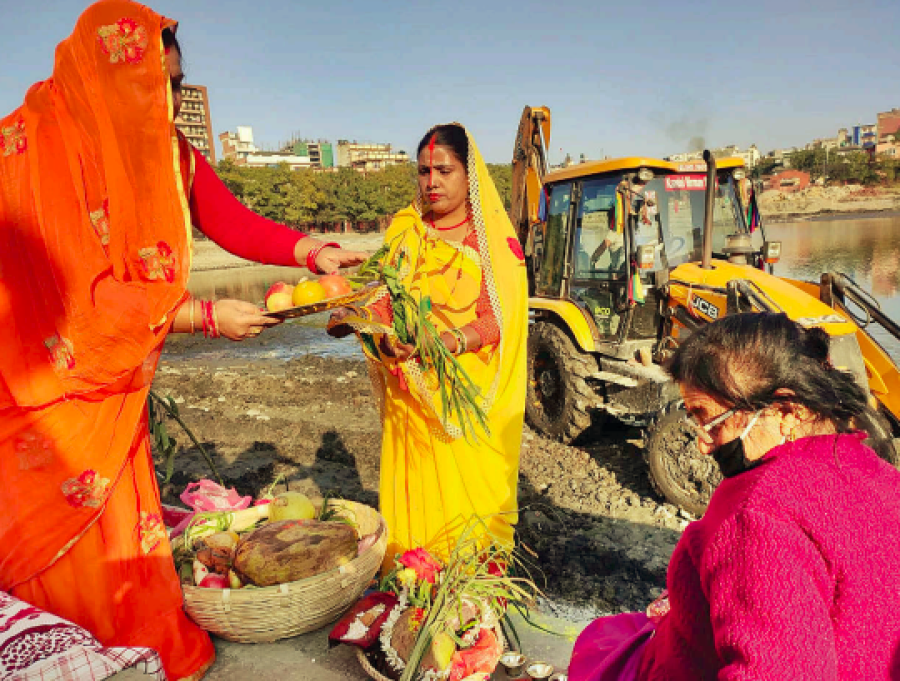Valley
Devotees observe lack-luster Chhath festival in Kathmandu
Cultural experts say the Covid-19 has impacted all religious practices, festivals and people’s daily way of life
Anup Ojha
Kamalpokhari, one of the most happening places during Chhath festival in Kathmandu until last year, wore a deserted look on Friday.
Every year the area around the pond would be filled with hundreds of devotees clad in yellow and red, and hymns would be played on loudspeakers. The reflection of the setting sun would be visible on the water as people worshipped it.
But this year, the pond, which has been drained under a restoration plan, saw only a handful of people celebrate the festival due to Covid-19-related restrictions announced by local authorities.
“It feels really bad, there are very few people. There is no water nor decoration, ” said Punita Gupta, 39, who came from Shantinagar to celebrate the festival along with her husband Binod and two childrens. “How am I going to worship the sun god without water?” she said as a backhoe loader dug mud from the middle of the pond.
Kathmandu Metropolitan City had started the renovation work in 2018, but even after two years, nothing substantial has been done to restore the pond. Rajendra Singh, coordinator for Kamal Pokhari Chhath Puja Society, said Kathmandu Metropolitan City has allocated Rs 96.5 million for the beautician of the pond that spreads over 29 ropanis of land.
During the past decade, the pond had become a place of worship for people from the Terai and even the hilly region. It had become a symbol of harmony between people from different parts of the country who celebrate Chhath.
Chhath is an ancient Hindu festival celebrated in Nepal’s Madhesh and in the Indian states of Bihar, Jharkhand, and Uttar Pradesh.
Hindus dedicate Chhath Pooja to the Sun god and his wives Usha and Sangya (Sandhya), thanking them for blessing the bounties of life on earth, and to pray for granting them certain wishes.
Devotees observe the rituals of the festival over four days. They include holy bathing, fasting and abstaining from drinking water, standing in water for long periods, prayer offerings and argha to the setting and rising sun.
“Last year over 7,000 people celebrated the festival on the pond,” said Singh, the coordinator of the Chhath society. “But this time, hardly 100 came as Kathmandu District Administration Office last week issued a prohibitory notice,” he said. “But we could not stop those who came.
Raksya Shrestha, one of the members of the committee distributing masks to worshippers, said this was the saddest Chhath festival she had ever seen. “It’s true that Covid-19 is killing people, but people are showing up despite government prohibitions,,” said Shrestha.
Besides Kamal Pokhari, other areas in Kathmandu such as Thapathali, Guheswori, also saw fewer people celebrate Chhath this year. The newly refurbished historic Rani Pokhari remained closed.
Cultural expert Om Dhaubhadel said the Covid-19 pandemic’s effect is being seen in cultural practices. “Earlier, only the Newa people in Kathmandu said that Covid-19 impactd their festival, but it has greatly impacted all religious practices, festivals and people’s daily way of life,” said Dhaubhadel.
Meanwhile, Gupta’s husband brought a jar of water to offer to the setting sun.
The Guptas used to go to Birgunj for Chhath every alternate year. “But this year we could not make it due to the coronavirus pandemic. Coming to this place was also a bad decision,” said Gupta as she tried to clean a spot near the pond to worship the sun.




 9.7°C Kathmandu
9.7°C Kathmandu.jpg)














